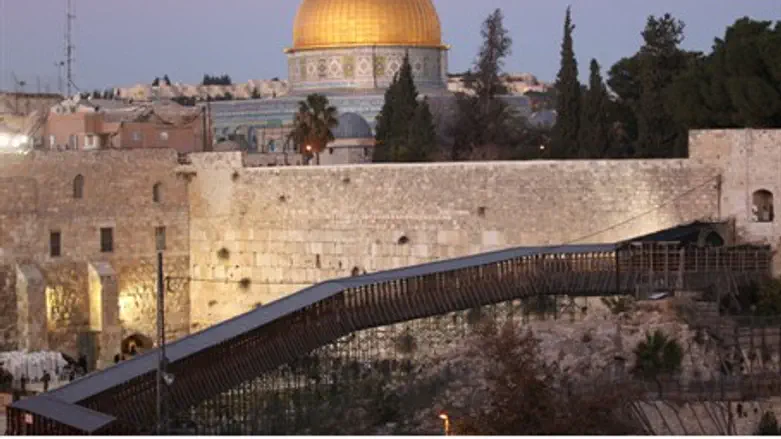
Supreme Court justices Eliakim Rubinstein, Uzi Fogelman and Tzvi Zylbertal on Tuesday rejected the appeal from "The Temple Mount Faithful" calling for the reconstruction of the Mughrabi Bridge.
The present Mughrabi Bridge, which connects the Western Wall Plaza to the Temple Mount, has been closed to the public since it was condemned as unsafe by civil engineers.
The group argued that courts have already said the Jerusalem Municipality could destroy the current bridge and build a new one, but that various government offices at the national level have refused to give their permission.
The Jerusalem Municipality informed the court that it has already approved building permit for a new Mughrabi Bridge, but that the government had interfered citing "special circumstances due to the present sensitivity of the Temple Mount."
However, since the petition was filed, the Jerusalem Municipality has updated its position saying that it will seek to remedy the safety issues with the present bridge and rescind the permit to build a new one.
In light of the fact that both the municipality and State claimed that the condition of the bridge can be remedied and does not compromise access for Jews to the Temple Mount, the court held that the petition should be dismissed.
"We believe that the primary purpose of the petition, to exercise the right to ascend to the Temple Mount, is not affected," the judges wrote. "Nor do we see the application of ‘special circumstances' here as sufficiently disruptive enough to violate the Basic Law."
"We express hope that the safety certificate, which is of course necessary, will be issued soon," they continued. "And, we note that there is no damage, even under these circumstances, to sovereignty over the Temple Mount."
Legal experts say the wording of the judge's opinion hints that the Supreme Court views ascending the Temple Mount as a basic right that may not be impinged under normal circumstances.
They also note that the judge's expressing hope that the requisite safety certificate would soon be awarded could be taken as a veiled warning to officials not to drag their feet in reopening the bridge.
The government's use of 'special circumstances’ – namely security considerations – to restrict Jewish access to the Temple Mount in the past, has been a point of contention in recent years.
The Knesset has repeatedly refused to declassify a confidential report from the State Comptroller citing serious failures by authorities to safeguard and maintain the Temple Mount.
Shin Bet officials argue the report should remain confidential on the grounds its contents are sensitive and its publication could result in confrontations and geopolitical changes at the site.
Critics, however, say security officials' real concern is the deep embarrassment the report could cause their political masters, as well as a loss of prestige stemming from public outrage over failures by their agencies to protect the heritage of the Jewish people, as delineated in the report.
Of greater concern, critics say, is the pervasive attitude among security officials that issues of public policy, such as the geopolitical disposition of the Temple Mount, are within their purview rather than that of lawmakers and the public they serve.
Keeping the report confidential, they say, is a method of manipulating public opinion.